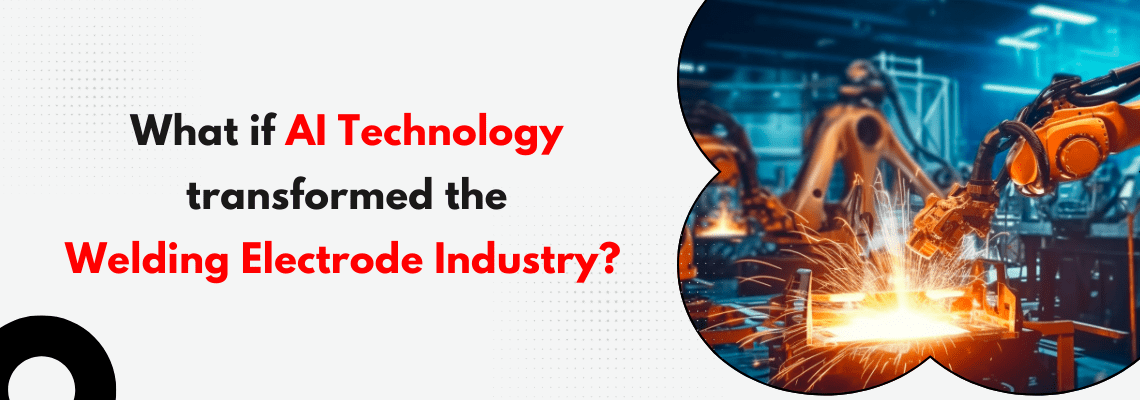The welding electrode industry, a key player in the manufacturing and construction sectors, has seen steady advances over the years. However, the introduction of AI technology promises to revolutionize this industry like never before. Imagine a world where welding processes become smarter, more efficient, and automated—all thanks to artificial intelligence. This article delves into the potential of AI technology in welding electrode industry and what the future could hold for this vital sector.
Understanding the Basics: Welding Electrode Industry
The welding electrode industry plays a pivotal role in various sectors, including construction, automotive, aerospace, and infrastructure development. Welding electrodes are consumable components used in welding to create a bond between metals. These electrodes need to be of high quality to ensure durability, strength, and precision in welds. For years, technological innovations have focused on improving materials, welding processes, and efficiency. Now, with the advent of AI technology, the industry is poised for a significant shift.
What is AI Technology?
Artificial Intelligence, commonly known as AI, refers to the development of computer systems that can perform tasks typically requiring human intelligence. These tasks include learning, problem-solving, decision-making, and adapting to new situations. AI technology is already making its presence felt across multiple industries, from healthcare to automotive, and now it is beginning to penetrate the welding electrode industry as well.
The Role of AI in Welding Processes
AI technology offers the potential to enhance every stage of the welding process, from planning and preparation to execution and inspection. Traditionally, welding has been a labor-intensive task, requiring skilled operators to manage complex variables like temperature, pressure, and electrode positioning. AI technology can now help automate these processes, leading to more accurate and faster results. By analyzing data from past welding projects, AI systems can optimize weld settings, ensuring stronger and more consistent results.
AI-Driven Automation in Welding Electrode Manufacturing
One of the most impactful changes AI could bring to the welding electrode industry is automation in manufacturing. AI can automate the production of electrodes by overseeing the quality control process, predicting equipment failures, and maintaining optimal production speeds. This level of automation reduces the margin for error, increases output, and ensures uniformity in the quality of electrodes. Automated systems, driven by AI, can operate 24/7, drastically improving production efficiency and lowering costs.
Improved Quality Control with AI Technology

Quality control is critical in the welding electrode industry, where even the slightest defect in an electrode can lead to faulty welds. AI technology can significantly improve the quality control process by utilizing advanced sensors and real-time data analysis. AI-driven systems can detect imperfections in electrodes that would be missed by human inspectors. By leveraging machine learning algorithms, AI can also predict potential failures in the welding process before they happen, enabling manufacturers to rectify issues in real time.
AI-Powered Predictive Maintenance
In any manufacturing process, equipment failure can lead to costly downtime and delays. AI technology can predict when machines or tools used in the welding electrode manufacturing process are likely to fail, allowing for preventive maintenance to be carried out. This predictive maintenance reduces unexpected breakdowns, improves equipment longevity, and ensures continuous production. The ability to foresee mechanical issues before they escalate is a game-changer for the welding industry.
Advanced Precision and Accuracy in Welding
Welding requires immense precision, especially in industries like aerospace, where even a minor flaw can have catastrophic consequences. With AI technology, welding systems can analyze thousands of variables—such as material type, temperature, and electrode wear—and adjust the process for optimal results. AI can help minimize human error and improve the overall accuracy of the welds, leading to higher-quality joints and fewer reworks.
Customization and Personalization of Electrodes
Another area where AI can make a significant impact is in the customization of welding electrodes. AI technology allows manufacturers to create personalized electrodes based on the specific requirements of a welding project. Whether it’s for a specific metal type, welding condition, or industry standard, AI can design and recommend electrodes that are tailored to the task at hand. This personalization enhances the performance of the electrodes and results in better welds.
How AI Enhances Worker Safety in Welding
Safety is a major concern in the welding industry, with workers exposed to risks such as high heat, toxic fumes, and harmful UV radiation. By incorporating AI into welding operations, many dangerous tasks can be automated, reducing the need for workers to be directly involved in hazardous environments. Additionally, AI systems can monitor working conditions, identify potential safety risks, and alert workers before accidents happen. This combination of automation and safety monitoring ensures a safer work environment for welding professionals.
The Future of the Welding Electrode Industry with AI
The integration of AI technology into the welding electrode industry is still in its early stages, but the potential for growth is immense. As AI systems become more advanced and accessible, we can expect to see further automation, enhanced precision, and improved safety across the industry. Additionally, AI-driven innovations in material science could lead to the development of new electrode types, better suited for advanced welding applications in industries such as aerospace, automotive, and defense.
Challenges in Adopting AI Technology
While the benefits of AI in the welding electrode industry are clear, there are also challenges that need to be addressed. Implementing AI technology requires significant investment in infrastructure, training, and maintenance. Many traditional welding companies may be reluctant to adopt AI due to the upfront costs and the complexity of integrating these systems with existing operations. Furthermore, the industry needs skilled workers who can manage and operate AI-driven machinery. Bridging this skills gap will be essential for the widespread adoption of AI technology in the industry.
The potential of AI technology to transform the welding electrode industry is undeniable. From improving automation and precision to enhancing worker safety and optimizing production, AI offers numerous advantages that could revolutionize how welding is conducted. As the industry continues to evolve, those who embrace AI early on are likely to gain a competitive edge. The future of welding may very well be shaped by intelligent systems, providing smarter, safer, and more efficient solutions for this essential industry.






